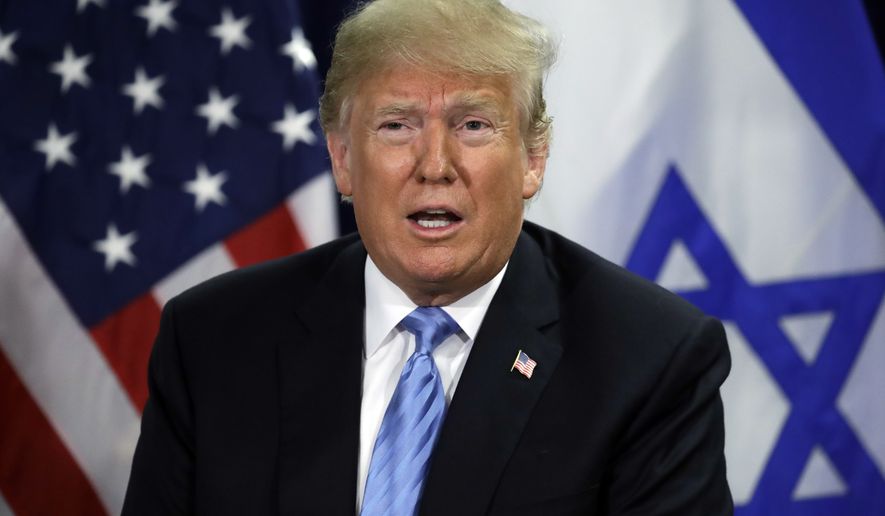UNITED NATIONS — Veering off the carefully negotiated agenda, President Trump told a U.N. Security Council meeting he was chairing Wednesday that China was meddling in the upcoming U.S. midterm elections to undercut his tough trade agenda.
Mr. Trump, wrapping up three days of high-stakes diplomacy here at the annual U.N. General Assembly gathering, said at the top of a meeting that was officially dedicated to the problem of weapons proliferation that the Chinese government is trying to subvert the U.S. vote out of frustration over his administration’s bare-knuckle trade posture toward Beijing.
“Regrettably we have found that China has been attempting to interfere in our upcoming 2018 election, coming up in November, against my administration,” Mr. Trump said, breaking from protocol at the traditionally highly-scripted Security Council.
“They do not want me or us to win because I am the first president ever to challenge China on trade, and we are winning on trade — we are winning at every level.”
Speaking later in the same session, Chinese Foreign Minister Wang Yi appeared to break from his prepared statement at the end to deny what he called the “unwarranted” U.S. accusation of election meddling.
“We do not and will not interfere in any countries’ domestic affairs,” said Mr. Wang. “We refuse to accept any unwarranted accusations against China, and we call on other countries to also observe the purposes of the U.N. charter and not interfere in other countries’ internal affairs.”
While Mr. Trump did not offer specifics at the Security Council session, the president indicated later he that he was referring in part to China’s retaliatory tariffs against U.S. farm products, as opposed to the type of cyberhacking that Russia conducted in the 2016 U.S. elections.
“You have statements made [by the Chinese] that they were going to hit our farmers, those are my voters,” Mr. Trump told reporters. “I love the farmers, I’m taking care of the farmers.”
The president refused at a press conference later Wednesday to detail what steps the U.S. will take against China, but insisted again, “They’re trying to convince people to go against Donald Trump.”
In a conference call arranged by the White House, a senior administration official said China is using a “whole-of-government approach” to interfere in the U.S. democratic system, including political, economic, commercial, military and informational “tools.”
“The activities have reached an unacceptable level,” the official said.
Referring to targeted Chinese tariffs, the official said, “Some examples of the ways that China is actively interfering in our political system include hurting farmers and workers in states and districts that voted for the president, because he stood up to the ways that China has taken advantage of our country economically.”
China has responded to Mr. Trump’s tariffs in part by penalizing U.S. farm exports, hitting especially hard at Mr. Trump’s GOP base in Midwestern and southern states. China also placed a four-page ad in the Des Moines Register last weekend calling the dispute over soybeans “the fruit of a president’s folly.”
Mr. Trump used his post as this month’s holder of the rotating Security Council presidency to level fresh threats against Iran, saying new U.S. sanctions against Tehran will be in place within weeks, and that even more penalties against Tehran are being prepared to curb its military programs and support for anti-U.S. proxy groups.
“All U.S. nuclear-related sanctions will be in full force by early November,” Mr. Trump said. ” … After that, the United States will pursue additional sanctions, tougher than ever before, to counter the entire range of Iran’s malign conduct.”
But Mr. Trump’s criticism of the 2015 nuclear deal found little support in Wednesday’s sessions, as European leaders such as French President Emmanuel Macron and British Prime Minister Theresa May joined China’s Mr. Wang and Russian Foreign Minister Sergey Lavrov in urging that the deal be preserved.
Iran was not represented at the morning session, but Iranian President Hassan Rouhani told a Wednesday press conference in New York that the U.S. pressure campaign was failing and even predicted that an isolated Washington would eventually rejoin the pact. Mr. Trump found virtually no support from the 15-nation Security Council to scrapping the 2015 nuclear deal.
“We do not want to attack [the U.S.],” Mr. Rouhani told reporters. “We do not wish to increase tensions.”
⦁ Dave Boyer reported from Washington.
• Dave Boyer can be reached at dboyer@washingtontimes.com.
• Guy Taylor can be reached at gtaylor@washingtontimes.com.




Please read our comment policy before commenting.